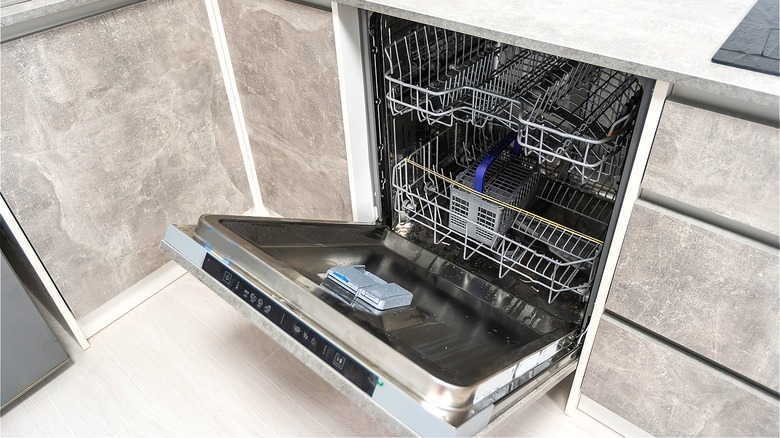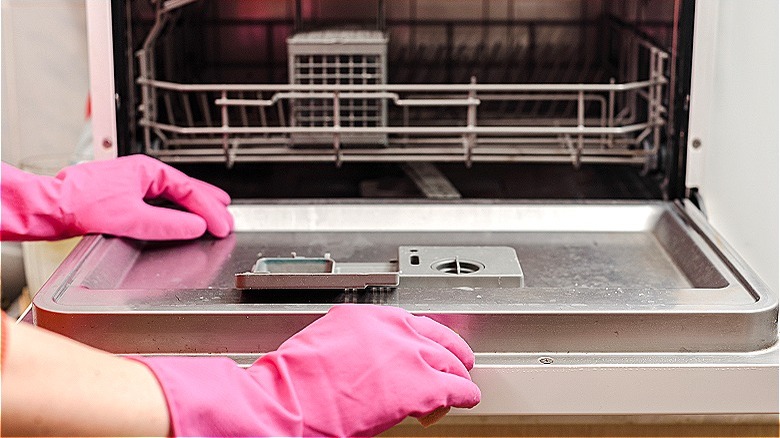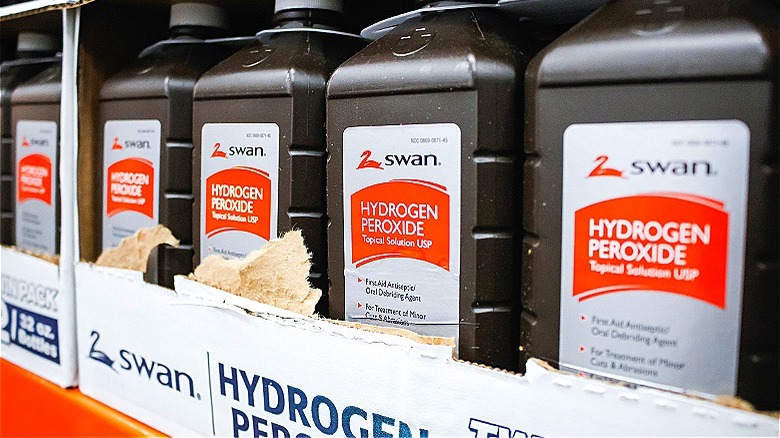Can You Use Hydrogen Peroxide To Clean Your Dishwasher?
You can pour hydrogen peroxide into your toilet to remove stubborn stains, add it to your washing machine to brighten whites, and soak your children's toys in the solution to sanitize with ease. But when it comes to cleaning your dishwasher, does the colorless liquid have what it takes to kill germs without harming you or your appliance? The answer is an unequivocal yes. Just tack it onto the ever-growing list of surprising ways to use hydrogen peroxide in your home.
Given its power to solve a myriad of household headaches, you may be shocked to learn that hydrogen peroxide is simply water with an extra oxygen molecule. Yet, it's that single molecule that gives hydrogen peroxide the ability to oxidize or bleach surfaces. Essentially, the chemical compound modifies the structure of dirt, grime, and bacteria, breaking them down and allowing for easy removal.
What's more, you don't have to spend extra money buying food-grade peroxide to sanitize your dishwasher. Rather, inexpensive 3% peroxide in the familiar brown bottle is strong enough to disintegrate food particles, grease, and mineral deposits that accumulate in the machine's tub, as well as built-up residue that clogs spray arms and filters.
Additionally, because hydrogen peroxide is only slightly more viscous than water, it's able to penetrate isolated areas of a dishwasher to eliminate debris that may be generating foul odors or obstructing the detergent dispenser. Moreover, unlike most commercial cleaners, hydrogen peroxide is non-toxic and safe to use around children and pets.
How to use hydrogen peroxide to clean your dishwasher
To sanitize your dishwasher using hydrogen peroxide, start by removing all the dishes from the machine. Next, examine the interior for any large pieces of food or debris that may be sitting at the bottom. Once it's cleared, pour 1 cup of hydrogen peroxide directly into the base of the tub and run a high-temperature wash cycle.
If you're tight on time and can't run a full cycle, consider spot-treating dishwasher stains by spraying hydrogen peroxide directly on affected areas that are stained inside of your machine. Allow the liquid to sit for five minutes before wiping it with a clean microfiber cloth.
Conversely, if you've neglected the interior of your dishwasher over time, you may need to exercise a deep clean. This requires using a soft-bristled brush or sponge to gently scrub off any food or debris clinging to the dishwasher's interior components, including the spray heads. When you're done, add 1 cup of hydrogen peroxide to a dishwasher-safe measuring cup and place it on the machine's top rack.
Then run a cycle using the hottest water possible. Finish by thoroughly wiping down the inside of the dishwasher with a clean towel to remove excess water or allow the door to remain open overnight to air out the interior. By scheduling this type of deep clean once a month, you can maximize the efficiency of your dishwasher and add to the life of the machine.
Safety and storage tips for hydrogen peroxide
Adding ¼-cup of hydrogen peroxide each time you run a load of dishes is a perfectly safe way to add an extra level of sanitizing power to your machine. However, resist the temptation to mix other environmentally friendly pantry staples with hydrogen peroxide to boost your appliance's cleaning capacity, especially vinegar. Despite its reputation for being the ultimate cleaning tool, vinegar doesn't play well with hydrogen peroxide. Erase any thoughts that combining the two powerhouse disinfectants will make them better together. In reality, the opposite happens.
According to Houston Methodist Hospital, commingling hydrogen peroxide and vinegar creates peracetic acid, a potentially toxic substance, which can irritate your throat, lungs, eyes, and skin. Never mix the two liquids in a spray bottle to double down on tough dishwasher stains. However, if you insist on testing their cleaning virtues in succession, simply apply hydrogen peroxide to the affected area first, thoroughly wipe clean, and then add vinegar to the same surface to erase any residual debris.
Finally, if you're a budget-conscious homeowner, you may find it economically savvy to buy hydrogen peroxide in bulk, especially if you plan to use it in your dishwasher on a regular basis. If you do, keep in mind that hydrogen peroxide is sold in dark-colored bottles to keep light from breaking it down into pure water. You can delay this decomposition by storing hydrogen peroxide in a dark, cool area away from direct sunlight, per WebMD.


